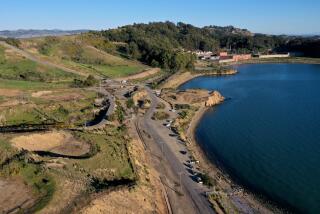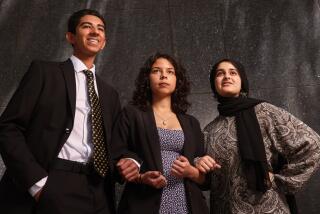Earth First! Pair Win Jury Award
OAKLAND — Ending a two-month trial and handing Earth First! activist Judi Bari a posthumous vindication, a federal jury awarded $2.9 million to her estate Tuesday after finding FBI agents and Oakland police officers violated her civil rights in their handling of a car-bombing investigation 12 years ago.
Bari, who died of breast cancer in 1997, and fellow activist Darryl Cherney were arrested for transporting explosives after a pipe bomb blew up in Bari’s car in May 1990, severely injuring her.
Prosecutors later declined to press charges and the two sued, complaining that the government had framed them and engaged in a smear campaign to discredit their movement against redwood logging on the North Coast.
A U.S. District Court jury deliberated for more than three weeks before reading its verdict around noon Tuesday from a complicated, 21-page form. The jurors awarded Cherney $1.5 million in damages.
Bari’s attorneys and supporters hugged and cried after the jury was excused. A few dozen environmental activists waved placards and cheered as the panel left the federal building in downtown Oakland.
The trial was seen by many on the political left as a test of broader allegations that the government unfairly disrupted the activities of radical groups beginning in the 1960s.
U.S. District Judge Claudia Wilken rejected the plaintiffs’ effort to make the trial a platform for such issues, including counterintelligence against the Black Panthers. But the victors still found in the verdict a broad condemnation of the FBI and other authorities.
“The FBI lied over and over again about me and Judi Bari and they used the Oakland [Police Department] as their lackeys,” said Cherney, who performed one of his activist songs on the witness stand.
“Suing the FBI is something more Americans need to be involved with.”
On the courthouse steps, Darlene Comingore, executor of Bari’s estate, said the verdict was “really beyond our wildest dreams. This jury got it .... We hope the FBI in Oakland and all the police departments out there that think they can violate people’s rights now know that they can’t get away with it.”
Defense attorneys declined comment as they left court. A Justice Department spokesman in Washington said his agency was reviewing the verdict and “would decide in the near future what our next step will be.”
Later in the afternoon, Oakland Deputy City Atty. Bill Simmons called the verdict disappointing and said the city will consider an appeal.
“As to much of the verdict, especially the 1st Amendment findings, we are just not able to understand what evidence they’ve relied on to come to those findings,” Simmons said.
Judge Wilken dropped two FBI defendants from the complaint for lack of evidence at the end of testimony. The jury cleared a third FBI defendant of any violation.
But six other defendants, three with the FBI and three with the Oakland police, were found to have violated Bari’s or Cherney’s civil rights to varying degrees.
In deciding liability, the jury placed the heaviest blame on Clyde M. Sims, an Oakland police lieutenant who headed his department’s investigation of the car bombing, FBI Agent John Reikes, who headed the terrorism squad in San Francisco, and Frank Doyle, an FBI bomb specialist.
Other defendants implicated in some way were the FBI’s Philip Sena and Oakland Police Officers Robert Chenault and Michael Sitterud.
The jury concluded that Bari’s 4th Amendment rights against unlawful search and seizure had been violated, as well as her 1st Amendment right of freedom of expression.
The jury was hung on whether Cherney’s 4th Amendment rights had been violated in connection with his arrest, but agreed they had been violated by a search warrant for his home. The panel also agreed that his 1st Amendment rights had been violated.
The jury rejected claims that the defendants had engaged in a conspiracy to deprive Bari and Cherney of their rights.
Dennis Cunningham, the plaintiffs’ lead attorney, speculated that the conspiracy charge may have seemed superfluous to the jury. “It really doesn’t detract from [the verdict] much,” he said. “The fact is that substantial violations were established.”
Cunningham, one of a team of attorneys who had worked on the case for years, said it is unusual for a civil rights lawsuit involving political activists to succeed.
“I’ve had a lot of such cases and most of them have not been that successful,” he said. But the behavior of authorities in the Bari case “was really calculated,” Cunningham said. “They had to really go out of their way to do this ... and I think the jury comprehended that in a full way.”
Judge Wilken instructed the jury of eight women and two men not to talk to the media after the verdict.
At the time of the bombing, Bari and Cherney were organizing “Redwood Summer,” a series of protests against the logging of old-growth redwoods. The case has never been solved.
During six weeks of testimony, the plaintiffs painted law enforcement as so eager to incriminate Bari and Cherney that they ignored death threats the pair had received and never bothered to conduct a thorough investigation.
The bombing put Bari in the hospital for two months and left her with permanent injuries. Cherney, a front-seat passenger in the car, suffered minor injuries.
The two key claims upon which investigators based the arrests were later contradicted or could not be proven: that nails wrapped around the crudely made pipe bomb matched those found in Bari’s home and that the device went off when it was sitting in open view on the car’s rear floorboard.
The FBI crime lab subsequently concluded that the bomb had exploded under Bari’s seat. And prosecutors found the nails had been manufactured in such large batches that a close match was impossible.
Though charges were never filed against Bari and Cherney, they complained the arrests and ensuing publicity forever damned them in the public eye as violent terrorists who had blown themselves up.
Bari gave a videotaped deposition shortly before her death. Parts of it were presented during the trial on large-screen monitors in the courtroom.
Cherney, shorn of the bushy North Woods beard he had at the time of the bombing, took the stand, at one point performing “Spike a Tree for Jesus” for the jury.
During closing statements, Cherney’s attorneys apologized for the song, conceding that it might have been a bit much for a federal courtroom.
In testimony, FBI and Oakland Police Department defendants both pointed to the other agency as the one that rushed to judgment in the arrests.
Defense attorneys also said their clients had handled the investigation properly, and had ample reason to arrest Bari and Cherney.
They cited provocative statements by Cherney as evidence that he was not the peaceful environmental organizer he presented himself to be.
In a 1990 network television interview, Cherney had said that if he were terminally ill, he would strap explosives to himself and blow up a dam or corporate headquarters after hours.
Heroes to many in the environmental movement, Bari and Cherney were viewed widely as dangerous radicals by management and workers in the California timber industry.
Mary Bullwinkel, spokeswoman for Humboldt County-based Pacific Lumber Co., a longtime target of the Earth First! organization, said the company had no comment on the verdict.
But environmental groups in Northern California were encouraged by the jury’s decision and substantial award.
“Environmental groups will be hardened and empowered by this decision,” said Dana Stolzman, a member of the Environmental Protection Information Center, a Mendocino County-based advocacy group for the protection of old-growth forests.
Stolzman said the 1990 arrests of Bari and Cherney had a temporary chilling effect on the environmental movement.
The verdict, Stolzman said, “affirms that the 1st Amendment rights should be upheld. People should be able to advocate the protection of ancient redwoods without risking their lives.”
*
Alexander reported from Oakland, Boxall from Los Angeles. Also contributing was Times staff writer Rone Tempest.
More to Read
Sign up for Essential California
The most important California stories and recommendations in your inbox every morning.
You may occasionally receive promotional content from the Los Angeles Times.











